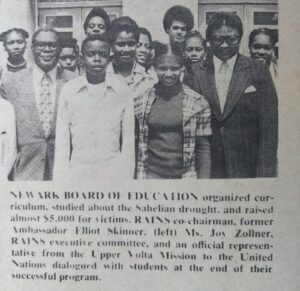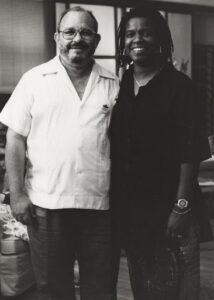Making Global Connections for Justice
Solidarity with African Liberation Struggles
IFCO established its Taskforce on African Affairs to connect Black movements in the US to African liberation struggles in Namibia, Zimbabwe, Tanzania, South Africa, and Guinea Bissau, among other countries. IFCO developed a number of Africa solidarity projects, including RAINS, an early climate change activist campaign and organized a North American delegation to the 6th Pan African Congress in Dar es Salaam in 1974.
RAINS: Climate Change Solidarity in the Sahel

IFCO’s support of African Liberation struggles led to its creation of the RAINS project, which collected material aid relief for the drought-stricken Sahel region in Africa. IFCO’s relief effort was based on solidarity, not charity and clearly identified the cause of the extended drought to be climate change (see graphic from IFCONEWS newsletter) and the legacy of colonial and neo-colonial capitalism in the region. In stark contrast to the White Savior Complex based Africa programs that have become an industry, IFCO’s Africa relief programs sought to connect US Black communities with the Africa and involve multiracial constituencies to support relief efforts that would challenge neocolonialism rather than reinscribe it. School, college and community groups across the US participated in raising funds and material aid for the RAINS project (see images from IFCONEWS newsletter).
FROM a 1974 IFCO Report:
“…experts estimated that six million more would die from famine and disease before the year was out. The International Red Cross disagreed, stating 13 million more were endangered.”
“The recent period of drought is not alone responsible for the vast desertification of the Sahelian zone. The earth has been robbed of its mineral wealth many years before by the French colonialists who used the area to farm cotton and plant peanuts for their use in trade. While French businessmen fattened off the exploited resources of the Sudano-Sahelian territories, its people lost the only economic resource they had. Land which had been used to graze cattle and sheep were ploughed under for the colonial crops. Thirsty vegetation drank up the water supply and no irrigation or artesian projects were built to replace it” (IFCO 1974 Report, 9).
Solidarity with Central America in the Wake of U.S. Wars

In the 1980s, the US government and corporations continued to wage war in Latin American countries by backing reactionary, far right forces especially in Central America. Reagan’s “Low Intensity Conflict” policy gave the US military and CIA free reign to arm and direct right-wing militias, causing civil wars throughout the region and enriching US corporations that violently opposed any Latin American progressive governments. At the same time, the Reagan regime rejected Central American immigrants fleeing the war torn region to the US. To counteract the US government policy of creating war in and rejecting immigrants from Central America, IFCO launched the Central American Information Week (CAIW) campaigns.

IFCO staff organized CAIW campaigns by state and included church, community, legislative and press outreach events that often featured Central American faith leaders and activists to speak directly to the impact of US-backed wars in the region. The CAIW model was highly successful in educating the US public about US policy towards Central America and more importantly — mobilized a grassroots network to change it.
 A CAIW in Virginia reached 19,754 people via 568 events in churches and schools in 78 communities, prompting Rev. Cessar Scott, executive director of the Baptist General Convention of Virginia to laud IFCO’s work:
A CAIW in Virginia reached 19,754 people via 568 events in churches and schools in 78 communities, prompting Rev. Cessar Scott, executive director of the Baptist General Convention of Virginia to laud IFCO’s work:
“IFCO has done a tremendous job organizing Central American Information Week in Virginia; especially when you consider how conservative our state is.”
The CAIW campaigns would also serve as the model for the Pastors for Peace caravans.
